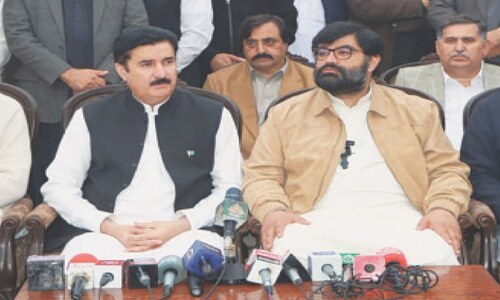PESHAWAR: A Peshawar High Court bench has sought replies from the federal and Khyber Pakhtunkhwa government about a reference to decide some legal complications, which have emerged after the merger of tribal districts with the province and abolition of Frontier Crimes Regulation in the region.
Chief Justice Waqar Ahmad Seth and Justice Nasir Mehfooz also issued notices to the attorney general for Pakistan and provincial advocate general asking them to assist the court on issues in question.
The reference was prepared by the high court as certain issues surfaced following the enactment of the Constitution (Twenty Fifth Amendment) Act, 2018, through which the erstwhile Federally Administered Tribal Areas were merged with Khyber Pakhtunkhwa.
Asks AGP, provincial AG to assist it on matter
The colonial-era FCR was repealed through the Fata Interim Governance Regulation (FIGR) in May 2018.
However, certain FIGR provisions about judicial powers assigned to administrative officers were declared unconstitutional by the high court on Oct 30, 2018 with the government being told to introduce a regular judicial system in tribal districts within a month.
The Supreme Court upheld the said judgment on Jan 16 and gave six months time to the government for enforcing regular laws in the erstwhile Fata.
One of the legal issues, which surfaced after the abolition of FCR, is about the appellate powers earlier assigned to the relevant commissioner.
Under the FCR and FIGR, the concerned commissioner was given the status of the appellate court but the commissioner no longer has those powers.
Similarly, the Fata Tribunal, the final judicial forum working under the abolished FCR with revision powers, also became non-functional after the abolition of the FCR.
The high court will now decide in the reference as to which of the forum will exercise those powers.
Moreover, another issue is about the execution of decisions made by the deputy commissioners under the FCR in tribal districts.
As the deputy commissioner no longer exercise judicial powers, the legal complications have surfaced about the implementation of those judgments.
In the reference, the high court also pointed out that scores of criminal cases in former Fata relate to terrorism but there exists no anti-terrorism court in tribal districts.
As under the Anti-Terrorism Act, 1997, only the special anti-terrorism court could hear such cases, there is a legal vacuum about the hearing into those cases.
Additional advocate general Waqar Ahmad Khan appeared for the government in the case.
The bench directed the attorney general and advocate general to show up and give viewpoints on the issues raised in the reference.
Published in Dawn, March 16th, 2019















































Dear visitor, the comments section is undergoing an overhaul and will return soon.